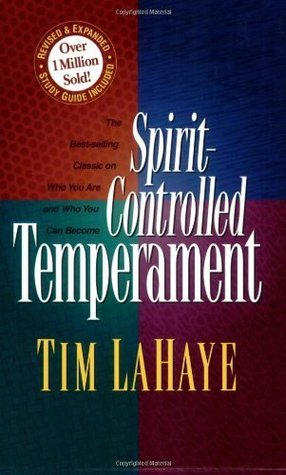More on this book
Kindle Notes & Highlights
God has given Christians the Holy Spirit, who is able to improve our natural strengths and overcome our weaknesses—as we cooperate with him.
The theory of the four temperaments
is the oldest on record, going back more than three thousand years:
the four were given names by Hippocrates, said to be the father of modern medicine. Galen, a Greek doctor, came up with a detailed list of the strengths ...
This highlight has been truncated due to consecutive passage length restrictions.
Transformed Temperaments,
we all inherited a basic genetic temperament that contains both our strengths and our weaknesses.
To properly understand the temperament’s control of our actions and reactions, we should define three terms and carefully distinguish among them: temperament, character, and personality.
Temperament
Temperament is the combination of inborn traits that subconsciously affects all our behavior.
These t...
This highlight has been truncated due to consecutive passage length restrictions.
are passed on by o...
This highlight has been truncated due to consecutive passage length restrictions.
Character
Character is the real you.
It is the result of your natural temperament modified by childhood training, education, and basic attitudes, beliefs, principles, and motivations. It is sometimes referred to as “the soul” of a per...
This highlight has been truncated due to consecutive passage length restrictions.
Character combines your temperament, training, moral values, beliefs...
This highlight has been truncated due to consecutive passage length restrictions.
It is what you really are when there is no one else around. What you do when you have the freedom to do what you want t...
This highlight has been truncated due to consecutive passage length restrictions.
Personality
Since temperament traits are inherited genetically from our parents, we should keep in mind some of the natural factors that influence them. Certain temperaments tend to follow certain gene pools.
Women often tend to be more emotionally expressive than men.
Many successfully develop their characters and improve their personalities, but it is doubtful that any are able to change basic temperament.
The Holy Spirit can,
modify our temperaments so that they appear to have been changed.
The apostle Paul put into words the heart-cry of despair felt by all sincere people who lament their weaknesses of temperament:
temperament weaknesses can be strengthened!
“Therefore, if anyone is in Christ, he is a new creation; old things have passed away; behold, all things have become new.”
Since temperament is our “old nature,” what we need is a “new nature.” That “new nature” is imparted to us when we receive Je...
This highlight has been truncated due to consecutive passage length restrictions.
The “divine nature” that comes through Jesus Christ is the only escape from the control of our natural temperament, for only through him are we made “new creatures.”
the moment we receive Jesus Christ, we receive the “new nature” that is able to cause old things “to pass away” and all things to “become new.” This change or modification of behavior is not automatic; we must cooperate with the Spirit of God within us to experience that change. We shall see that the filling of the Holy Spirit is not only commanded by God for every Christian (see Eph. 5:18), but this filling results in the Holy Spirit so controlling our natures that we actually live the life of Christ.
Nearly four hundred years before Christ, Hippocrates, the brilliant Greek physician and philosopher, propounded the theory that there are basically four types of temperament. He erroneously thought these four types were the result of four liquids that predominated in the human body: blood; “choler” or “yellow bile”; “melancholy” or “black bile”; and phlegm.
To him, these suggested the lively (Sanguine), active (Choleric), black (Melancholy), and slow (Phlegmatic) temperaments.
the fourfold names for the classifications are still widely used.
There is a danger in presenting these four types of temperaments.
This temperament theory is not a club with which to bludgeon friends.
the temperament categories shouldn’t be seen as an excuse to indulge negative behavior.
But an understanding of them can be particularly helpful to analytical persons who tend to exaggerate and dwell on their own weaknesses.
An understanding of the temperaments is also particularly helpful for those who have difficulty assessing the...
This highlight has been truncated due to consecutive passage length restrictions.
Sparky Sanguine
Sparky Sanguine is the warm, buoyant, lively, and fun-loving temperament. He is receptive by nature, and external impressions easily find their way to his heart, where they readily cause an outburst of response. Feelings rather than reflective thoughts predominate to form his decisions.
Temperament and the Christian Faith,
Rocky Choleric
Rocky Choleric is the hot, quick, active, practical, and strong-willed temperament. He is often self-sufficient and very independent. He tends to be decisive and opinionated, finding it easy to make decisions for himself as well as for others.
Maestro Melancholy is often referred to as the “black” or “dark” temperament. Actually he is the richest of all the temperaments, for he is an analytical, self-sacrificing, gifted, perfectionist type, with a very sensitive emotional nature. No one gets more enjoyment from the fine arts than the Melancholy.
By nature Maestro is prone to be ...
This highlight has been truncated due to consecutive passage length restrictions.
Sometimes his moods will lift him to heig...
This highlight has been truncated due to consecutive passage length restrictions.
at other times he will be gloomy and depressed; during these periods he is withdrawn and ...
This highlight has been truncated due to consecutive passage length restrictions.
Maestro Melancholy is a very faithful friend, but, unlike the Sanguine, he does ...
This highlight has been truncated due to consecutive passage length restrictions.
He will not push himself forward to meet people but lets ...
This highlight has been truncated due to consecutive passage length restrictions.


